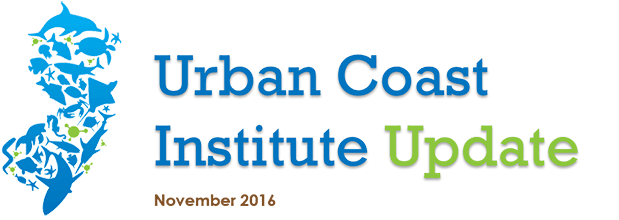
Register Now for Future of the Ocean Symposium & Ocean Champions Luncheon
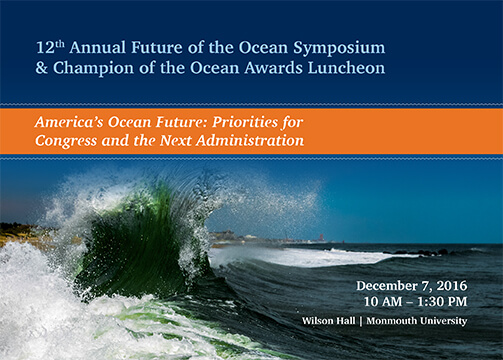
The UCI’s signature annual event returns Dec. 7 with a panel discussion focused on ocean priorities for the next administration and Congress. Following the symposium we’ll present Champion of the Ocean Awards to former New Jersey Gov. Christine Todd Whitman, University of Maryland Center for Environmental Science President Donald Boesch, and the NJDEP’s Bill Rosenblatt and Elizabeth Semple. The symposium is free and open to the public; tickets are required for the awards luncheon.
Rockefeller and Monmouth Universities Host National Ocean Exploration Forum in New York City
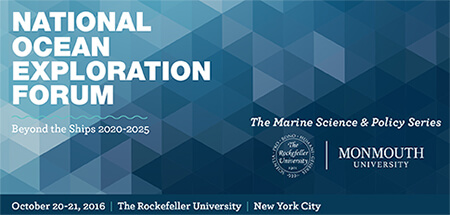
Over 100 leading figures in marine science gathered in New York City on Oct. 20-21 for the 2016 National Ocean Exploration Forum, “Beyond the Ships: 2020-2025,” co-hosted by The Rockefeller University and the Monmouth University Urban Coast Institute. At the forum, scientists and ocean explorers presented an array of amazing discoveries from recent expeditions and discussed how emerging technologies such as drones and ROVs will transform the field over the next decade.
The forum was the first installment in the Marine Science & Policy Series of four scientific conferences to be co-hosted by Rockefeller and Monmouth annually on alternating campuses. Read a full summary of the forum or visit the forum home page for downloadable papers and other materials from the event.
Links: News Coverage of National Ocean Exploration Forum
The UCI-RU National Ocean Exploration Forum received coverage from more than 300 news sources in over 30 countries. Below is a sample.
Scientists find 500 U.S. seabed vents of powerful greenhouse gas, Reuters
500 ‘Champagne’ Methane Seeps Discovered Off Pacific Coast, Live Science
Remotely operated vehicles expand reach for ocean researchers, WorkBoat Magazine
Exploring Vast ‘Submerged America’ Discovered 500 Bubbling Methane Vents, Eurasia Review
Ocean Champion Ballard Recalls a Life Exploring the Sea and Charts Course for Future Discoveries
The Monmouth University Urban Coast Institute (UCI) awarded its highest honor, the National Champion of the Ocean Award, to world-renowned ocean explorer Dr. Robert Ballard during a special ceremony in New York City on Oct. 21. The award was presented by Monmouth University President Paul Brown and UCI Director Tony MacDonald at the 2016 National Ocean Exploration Forum, co-hosted by Monmouth and Rockefeller universities.
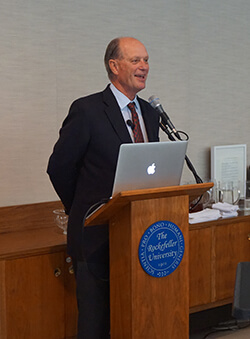
Ballard recounted some of his discoveries from over 50 years and 150 expeditions at sea, including the wrecks of the Titanic, the
Bismarck, the USS Yorktown, and President Kennedy’s PT-109. Although he said unearthing human history undersea tends to capture the public’s imagination most, Ballard said he’s equally or more proud of his natural discoveries, such as his 1977 discovery of deep sea hydrothermal vents, which scientists believe could be the origin point for life on earth.
The two-day forum gathered more than 100 of the world’s leading marine scientists and ocean explorers, with discussions heavily focused on how emerging technologies such as autonomous drones or remotely operated vehicles would impact the field in the coming years. Ballard challenged the scientific community to employ diverse crews and value their unique insights as much as the technologies.
“If you really expect to play the game, you better have a corps of exploration that looks like the country,” Ballard said. “Every child needs to see their face in the corps to know they can play.”
UCI Director Tony MacDonald said one of his conclusions from the forum was that ocean exploration was at a “pivot point” due to machines that will make it possible to cover more ground at a faster pace and a new generation tech-savvy explorers rising up the ranks. He credited Ballard for embracing these changes and being ready to take advantage of them in future expeditions.
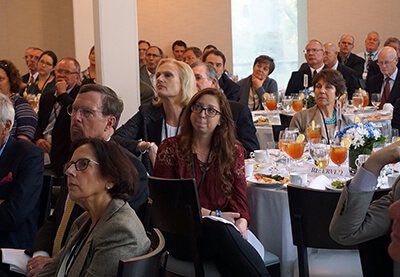
“He is always thinking about not only the research, but the talent, the next generation, the students; the communications about what he’s doing, telling the story about what ocean exploration is,” MacDonald said. “He is a full product.”
Ballard is the president of the Ocean Exploration Trust, which owns and operates the E/V Nautilus;, and the founding director of the University of Rhode Island’s Center for Ocean Exploration; a former commander in the U.S. Navy; and an explorer-in-residence for the National Geographic Society, among many other accomplishments. He received an honorary degree from Monmouth University in 2004 and served as that year’s commencement speaker.
“The Champion of the Ocean Award was established in 2005 to honor individuals who have demonstrated sustained leadership in keeping our coasts and oceans clean, safe, sustainably managed, and preserved for the benefit and enjoyment of future generations,” Brown said. “Our roster of distinguished Ocean Champions is a ‘who’s who’ of leading voices in oceanography, marine science, and policy.”
National Academy of Sciences President Marcia McNutt and Texas Congressman John Culberson, chairman of the Subcommittee on Commerce, Justice, Science and Related Agencies, sent letters of congratulations to Ballard for receiving the award.
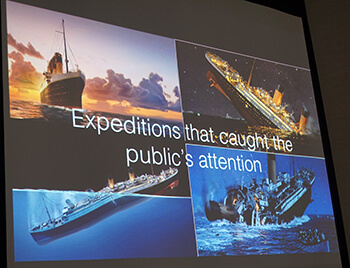
“You grew up in San Diego next to the ocean, and have talked about how growing up with the ocean inspired you to explore it,” Culberson wrote. “Over the years, you have passed your zeal for exploration onto thousands of students – including me.”
The forum was the first of four Marine Science & Policy Series conferences to be co-hosted by Rockefeller and Monmouth annually on alternating campuses. Monmouth University students Maria Ardila-Jimenez, Taylor Donovan, Kylie Johnson and Cayla Sullivan assisted with the two-day event’s organization and participated in its sessions.
Four additional honorees will be recognized at the 2016 Future of the Ocean Symposium and Champions of the Ocean Awards Luncheon, to be held Dec. 7 at Monmouth University. They are Joint Ocean Commission Co-Chair and former New Jersey Gov. Christine Todd Whitman, University of Maryland Center for Environmental Science President Donald Boesch, and David Rosenblatt and Elizabeth Semple of the New Jersey Department of Environmental Protection. The symposium will be free and open to the public; tickets are required to attend the luncheon.
Additional Links
2016 National Ocean Exploration Forum home page
The Champion of the Ocean Award
MU Scientists Seek Evidence of Climate Trends in Coastal Tree Ring Patterns
Pedram Daneshgar and Richard Bastian are trying to see the forest through the tree cores. The Monmouth University School of Science researchers and a student team have been extracting samples from tree trunks in the pristine coastal woods of Sandy Hook and Island Beach State Park in search of evidence that may reveal trends in climate change and severe weather along the Jersey Shore.
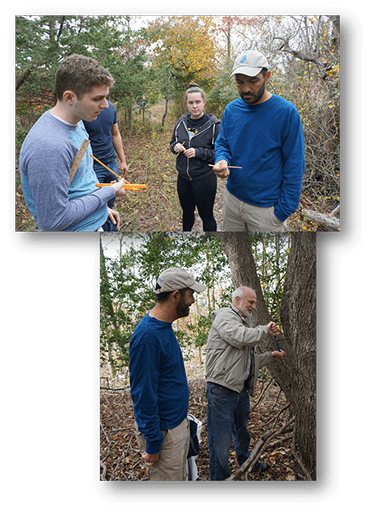
It’s a story that will be told by the annual rings of each tree. The researchers will measure and compare patterns in their thickness, which change in response to their environment.
“We want to definitively show that climate change and rising CO2 levels are having a definitive impact on growth,” said Dr. Daneshgar, an associate professor in the Department of Biology. “We should be able to see that in the tree cores. As the trees are responding to increased CO2 they should grow faster, get bigger and taller. We also want to see if the data tells any stories about climate patterns in the area.”
Daneshgar and Bastian, a lecturer in the Department of Mathematics, are conducting the research as part of a new class they designed that is focused solely on the project. They jointly teach the course, with Daneshgar guiding discussions on biological questions and Bastian steering the statistical analysis. The three math majors and 12 biology majors in the class will spend the semester collecting tree samples in the field, then compiling and studying the data they collected in the lab.
Daneshgar said the approach they’re using is simple, but highly effective. The researchers are using tools called increment borers, which twist into a tree trunk like a corkscrew and pull out a small cylinder of its core. The specimen is then slid into a drinking straw for safe keeping, marked and taken back to the lab for examination.
The class seeks out the oldest, largest trees it can find – the more years, the more data they can provide. They are concentrating on some of the most common species found in maritime forests, an ecosystem that develops long after the establishment of vegetated dunes.
On a crisp fall day, Bastian worked up a sweat as he twisted the instrument into a thick, tough trunk. He said he enjoyed the opportunity to apply his math expertise out in a nature setting.
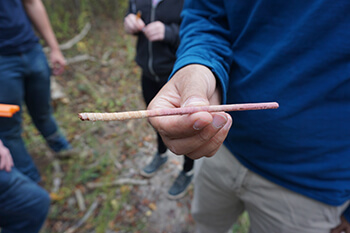
“I’m observing and seeing where various sources of error may be in terms of the data collection that might impact how we do the analysis,” he said.
For now, the project will focus on the two barrier islands in Monmouth and Ocean counties. But next year, Daneshgar said he hopes to expand the research to cover the entire Jersey Shore, Delaware and perhaps beyond. Projects like this have been conducted at specific confined sites, but never applied at such a large regional scale, he said.
Equipment for the research was purchased with grant funding provided by the Urban Coast Institute’s Marine Science and Policy Initiative, which is supported through the generosity of many private and corporate donors such as Santander Bank. If you would like to make a tax-deductible gift to the Urban Coast Institute, please use our Give a Gift Now contribution form.
View an album of photos of the class working on the project.
Artists Inspired by the Ocean’s Power and Our Vulnerability to It
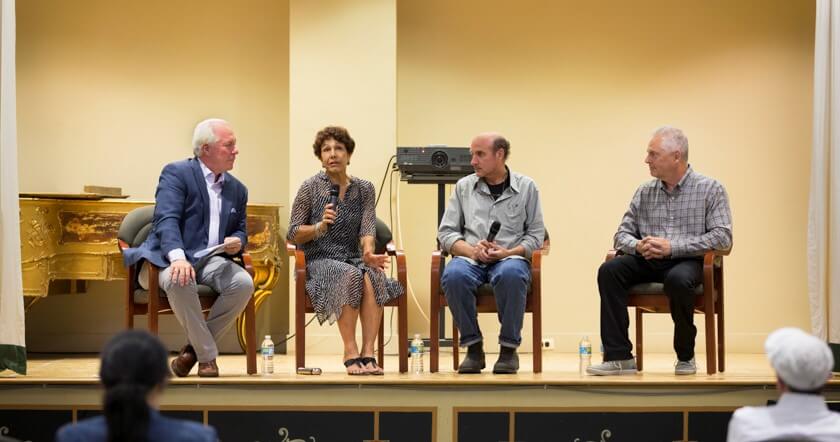
(Top, from l-r: Tony MacDonald, Lucy Kalian, Mark Ludak and Ira Wagner)
When Ira Wagner sees Superstorm Sandy-devastated homes being rebuilt above ground on stilts, he sees a metaphor for life.
“We’re all perched on these insignificant supports that we use to make our way in the world,” he said.
Wagner is one of three artists with collections that displayed at Monmouth University this semester that were inspired by the ocean and coastal resilience issues. The artists met to discuss the motivations and stories behind their works in a Sept. 28 conversation at the Great Hall, moderated by UCI Director Tony MacDonald.
Wagner and fellow Monmouth University Art & Design faculty member Mark Ludak’s joint photo exhibition Watersides explores the vulnerability of our coast and way of life to climate change and sea level rise. Wagner’s photos focus on the phenomenon of house-raising at the Jersey Shore, which was spurred by the catastrophic flooding experienced during the October 2012 storm. He said he was intrigued by people’s determination to risk rebuilding in waterfront areas, despite the near certainty that their properties would flood again, perhaps worse than before.
Ludak’s images showed infrastructure and urban areas surrounded by water, conveying both a sense of beauty and how powerless people are against nature. He said he was especially struck by the vulnerability of New Jersey’s waterfront industrial properties, and what might happen if some of the chemical plants and contaminated brownfields were overrun by floodwaters.
“As a photographer, if I’m able to record that, to make people think about that … then I will have made a small contribution,” he said.
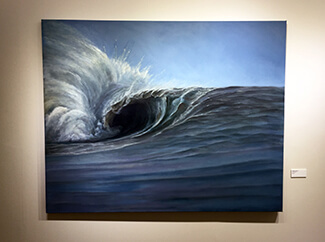
Although her medium is canvass, Lucy Kalian shared Ludak and Wagner’s commitment to recording scenes with a documentarian’s precision. Kalian’s
Swells & Soundings is a collection of oil paintings that centers on waves and the interactions between land and sea.
To prepare for the paintings, Kalian said she learned everything she could about waves, studying the science of how they form and break and closely observing their shadows and details. As she continued painting waves, she gravitated toward larger and larger canvasses, until a few of her works could cover full walls – a necessary step for conveying their power.
“I’m a realist in my life. I’m a realist in my painting,” Kalian said. “I love truth. I love beauty.”
Watersides by Mark Ludak and Ira Wagner will be on display through Nov. 20 from 10 a.m. to 5 p.m. at the Rotary Ice House Gallery. Members of the public are welcome to tour the gallery.
The discussion was presented by the UCI and Monmouth University Center for the Arts. Watch a video of the full event below.
Seeking Genetic Clues of Life in Coastal Waterways
Monmouth and Rockefeller universities are pioneering a marine life research technique that promises to be less expensive, more humane and more revealing than some longstanding scientific methods. Since the spring, faculty and students from both institutions have been gathering data that will reveal what fish species live in New York-New Jersey coastal water bodies using environmental DNA (eDNA) testing.

The effort is being led by Professor Jesse Ausubel (pictured left), director of the Program for the Human Environment at Rockefeller University, who delivered a lecture on the science of eDNA at Monmouth University on Sept. 22. Like a forensic investigation of a crime scene, eDNA research involves the collection and testing of genetic materials at a specific location to verify who ― or in this case, what ― has been there.
“When animals swim through an area of water, they shed dandruff and leave behind DNA through their defecation and urine,” Ausubel explained.
Scientists can filter out the biological materials in the water and use what he likened to short genetic barcodes to identify the types of organisms that were present in the area over the past few days. Monmouth student-faculty researcher teams have already sampled Wreck Pond in Spring Lake/Sea Girt and Lake Takanassee in Long Branch, with plans to examine additional local waterways in the future.
Rockefeller’s researchers have focused largely on water bodies in New York City. According to Ausubel, the team’s eDNA experiments detected more species of fish than were found by electrofishing or seining projects at the same sites.
However, Ausubel acknowledged that eDNA testing does have limitations that need to be addressed. Chief among them, water samples can easily be contaminated to falsely indicate the presence of unlikely inhabitants. For example, the DNA of a tuna could show up in a small pond because someone threw a piece of a sandwich in there, or a bird ate it out of a garbage can and left droppings in the water. He estimated that less than 1 percent of the results are these kinds of “rare reads.”
Ausubel noted that pairing eDNA testing with highly mobile technologies such as drones or remotely operated underwater vehicles could present new opportunities for ocean exploration, as efforts that require large ships and crews are expensive and difficult to repeat. A vast majority of ocean areas, particularly those far from shore, remain uncharted by humans.
“Learning what’s there is still very much a 21st century task of science,” Ausubel said.
Monmouth University’s eDNA research is one of many joint MU-RU projects being supported by the Urban Coast Institute’s Marine Science and Policy Initiative. Funding for the Initiative has been provided by Santander Bank and other generous private and corporate donors.
Thousands of Individual Marine Species Maps Now Available on Portal
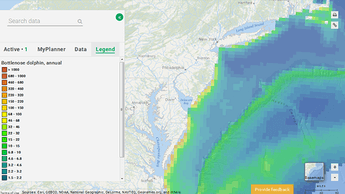
More than 3,000 maps showing populations and abundance for individual species of fish, birds and marine mammals along the East Coast are now available on the Mid-Atlantic Ocean Data Portal’s new searchable Marine Life Library. The online ocean mapping site is being developed by a project team that includes the UCI, the Mid-Atlantic Regional Council on the Ocean, The Nature Conservancy and Rutgers University.
Read a guide to using the new Marine Life Library or watch an instructional “How Tuesday” webinar co-hosted by the UCI’s Karl Vilacoba.
Coastal Community Resilience Planning Course at Monmouth U.
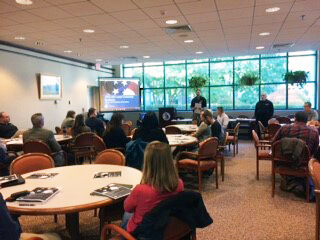 The Urban Coast Institute co-hosted a free coastal community resilience training course at Monmouth University on Nov. 4 designed to provide state and local government agency staff and other stakeholder groups with background on natural hazards. Approximately 40 participants took the course, which provided guidance for assessing community resilience and developing next steps for improved resilience.
The Urban Coast Institute co-hosted a free coastal community resilience training course at Monmouth University on Nov. 4 designed to provide state and local government agency staff and other stakeholder groups with background on natural hazards. Approximately 40 participants took the course, which provided guidance for assessing community resilience and developing next steps for improved resilience.
Attendees received Continuing Education Credit Hours for planners under the American Planning Association (APA), emergency managers under the International Association of Emergency Managers (IAEM), and floodplain managers under the Association of State Floodplain Managers (ASFPM). The course was facilitated by the National Disaster Preparedness Training Center at the University of Hawaii and Hawaii Sea Grant, and organized by the UCI in conjunction with the Stevens Coastal Center and New Jersey Sea Grant Consortium.
The UCI provides a range of assistance for communities seeking to assess their vulnerability to climate change, learn how sea level rise may impact their waterfront areas, apply for grants and more. Read more information about the UCI’s coastal resilience efforts. You may also contact Dr. Michael Schwebel at mschwebe@monmouth.edu or 732-263-5687.
Apply Now for Endowed Professor of Marine Science Position at MU
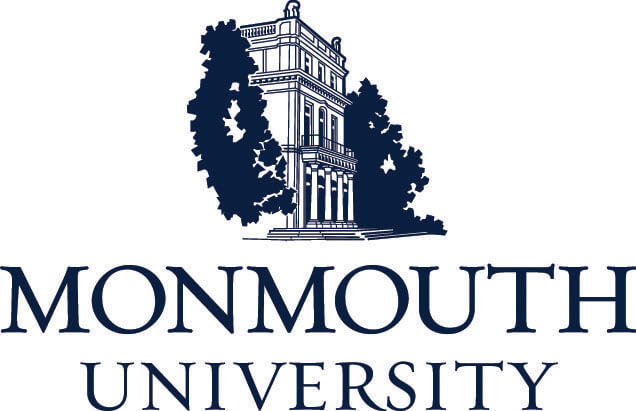
The Monmouth University School of Science invites outstanding applicants for the position of Endowed Professor of Marine Science. This is a position at the Associate Professor or Professor level in the Department of Biology. The incumbent will have a Ph.D. in Oceanography, Marine Biology, Marine Ecology, or a related marine science discipline and will occupy a key research and teaching position associated with our B.S. in Marine and Environmental Biology and Policy (MEBP). The incumbent will be expected to maintain an active research program and have a demonstrated record of success in securing grants and extramural support, and to work collaboratively with the Urban Coast Institute.
